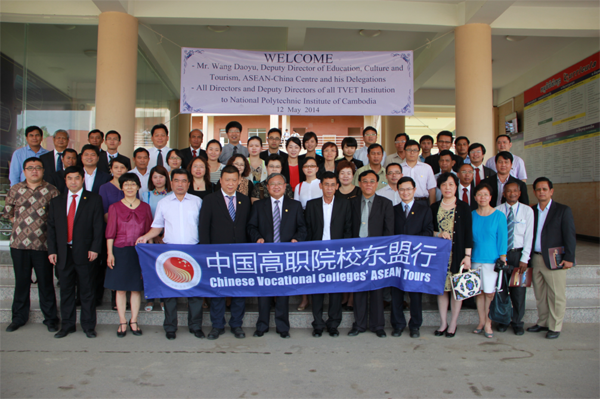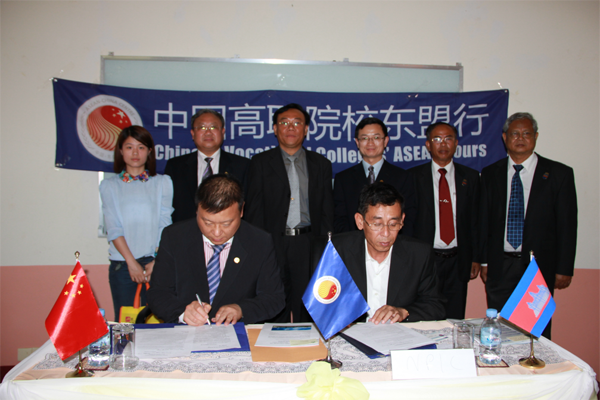
From 12 to 13 May 2014, a delegation of Chinese vocational colleges visited Cambodia, organized by ASEAN-China Centre (ACC), supported by the Chinese Embassy in Cambodia, Cambodian Embassy in China, the Ministry of Education, Youth and Sports of Cambodia (MEYS), and the Ministry of Labour and Vocational Training of Cambodia (MLVT). The delegation participated in the half-day China-Cambodia Partnership Workshop on Vocational Education, visited the Royal Polytechnic College of Cambodia and JVC Technical College, signed MoUs on inter-college cooperation with its counterparts, met with the Minister of MEYS, and paid a courtesy call to the Chinese Embassy in Cambodia.

The MLVT emphasized the importance of the China-Cambodia partnership workshop on vocational education, which was participated by 7 polytechnic colleges, technical colleges and skilled training center from Phnom Penh. Director General Laov Him, Department of Vocational Education and Training, MLVT, in his opening remarks stated the significant importance of promoting skilled labour to keep up with the pace of industrialization. The challenges that Cambodia included facing the lack of high quality education training facilities, courses that were not updated, and inadequate facilities. Nevertheless, Laov Him said that he was confident the cooperation between Cambodian and Chinese vocational colleges would gradually improve the quality of the education training in Cambodia.
During the workshop, the Chinese delegation learned about the development of vocational education in Cambodia, reform measures and its needs. MLVT oversees the development of the National Vocational Technical Education and Training (VTET), which is considered as the propellers of the Cambodian economy and supports the country's effort to eradicate poverty by providing training programs for the needy people to be employed in various enterprises. The 14 related policies by MLVT which had been approved by National Training Board supported the development of vocational technical education of Cambodia.
All of the 12 colleges from China met with their counterparts and discussed many areas for cooperation. Altogether, 30 MoUs were signed between Chinese and Cambodian colleges. The contents of the MoUs included commitments by the Chinese colleges to provide scholarships, student exchange programme, teacher communication, teacher training, course cooperation, student practice and facilities sharing.
During the visit, the delegation were also briefed by President Bun Phearin of the Royal Polytechnic College and President Sim Sorin of JVC Technical College about their respective institutions' expectations of cooperating with Chinese colleges. The delegation visited the teaching and training facilities of the two institutions, and pledged to further their cooperation with the Cambodian colleges.
The delegation paid a courtesy call to Minister Hang Chuon Naron of MEYS and were briefed on the development of education in Cambodia, and highlighted the current challenges and task, which was to improve the enrollment rate and completion rate of middle school, and insert life-skill education courses into ordinary middle schools. In this regard, the Minister sincerely hoped that Cambodia can learn from China's experience. Mr. Shen Shijiang, Head of delegation, Deputy Secretary of Commission of Jiangsu Institute of Commerce responded to the Minister's call and pledged to further strengthen the understanding and bilateral cooperation between vocational education and training institutions, thus, contributing to the social economic development of Cambodia.
During the delegation's visit to the Chinese Embassy in Cambodia, Mr. Cheng Hongbo on behalf of the Chinese Ambassador pledged to support the undertaking of ACC in promoting education cooperation between Chinese and Cambodian colleges.
Cambodia was the last stop of Chinese vocational colleges’ ASEAN tour. Through the three-nation ASEAN tour (Lao PDR, Myanmar and Cambodia), the delegation of 12 Chinese vocational colleges met high officials in charge of VTET of the three nations, discussed with 34 vocational technical colleges, signed altogether 99 MoUs, enhanced their understanding on vocational technical education and training condition and the needs of ASEAN Member States. This tour also provided confidence for the Chinese colleges to participate in education exchange programs in many fields. All the colleges expressed their willingness to support the establishment of ASEAN-China VTET cooperative alliance, strengthen research on ASEAN-China VTET, promote international exchange programs for Chinese colleges, branding of Chinese vocational education, service to the needs of the ASEAN Member States.